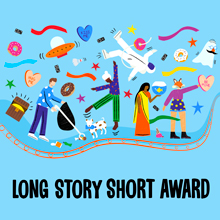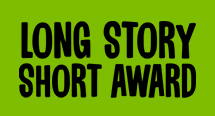The way Little Miss Perfect tells it, you'd think I was head of a gang of street thugs when I was a kid. We weren't thugs, we were twelve. All we wanted was some prize money, or at least a bit of ... [+]
The sun grew into a large, old asphalt ball that tardily melted down. Waves of heat rose off the ground, and the figures of Nguyet and her aged horse weaved slowly within the decaying wombs of the yellow village. Nguyet looked older than her actual age because of the bulging brown veins on the forehead and her beanstalk-like body. She walked behind her horse, held a small jute bag, and used a short soft twig instead of a rope to harness the horse. The horse was as old as Nguyet's son. After all these years, the day that Nguyet gave birth to her son was still smouldering in her memory: scissors, alcohol, white towels soaked in blood, the pain shot up her belly like fire; exhausted, she turned her stinging eyes to the open door on the right and saw the new-born pony reeled out of the straw and fell down on the ground.
Nguyet's eye itched. A tiny stream of tears left askew on the back of her hand. A private slaughterhouse was on the east side of the town gate. The butcher knives awaited this aged and frail animal. Nguyet faintly heard the clattering laughter, and saw the villager Dinh walking over and smoking.
"Gosh, it's so hot! You're going to the town? What for?"
Nguyet tucked her hair behind her ears. Her hands were trembling. "It's about time he went to the cooking pot." Words stuck at her throat. She stared at the horse as it ate the grass at the roadside, then she poked the horse with the twig again. Dinh was transfixed. His heart ached and hurried to put the twig down.
"My daughter used to ride it to school, it's our old friend. You can't do that..." Dinh caressed the scars on the horse's neck.
The horse snorted. Sadness welled up in Nguyet's mind. She spoke with a husky voice: "Well! Anyway, he would either go to the cooking pot or starve to death." Dinh knew he could do nothing to change her mind. He sighed and left. The horse swished his tail to wave goodbye.
The bald trees were still wuthering, calling to get their souls back from the wind. Nguyet quivered as she imagined her own body being cut through by the butcher knife, everything went apart: her nose, eyeballs, forehead, teeth, lips, bones; her last bloody breath dissipated in the air like the salty fog off the Dead Sea.
The twig dropped to the ground. She stopped on the side of the road with vertigo. Her sleep-twisted hair messed up so ghostly that no light could worm through. When she picked up the twig, she found that the old horse was drinking water from a small ditch.
Let him drink! This would be the last time for him to drink water!
The old horse rested beside the ditch and breathed gently. Nguyet called him with a soft dreamy voice: "Come on! Go to the town. There's no other option." The horse didn't move. He was lying on the ground like a baby falling into the sweet black slumber with hymns of lullaby. Nguyet anxiously patted on the horse and tried to drag him up. Desperately in need of money, she had very limited time to sell the horse--her last valuable property--for pressing need.
The horse remained glued to the dusty earth. Nguyet was enraged and whipped the horse's body repeatedly. The twig snapped. The two of them finally proceeded to walk on their way. They went past a few bleak cottages, half-drunk monks, and a tumbledown temple that glared at passers-by dreadfully with unfathomable darkness. A child's corpse was roughly wrapped up by a broken straw mat beside the temple, his poor little feet stuck out from the wild grass. Nguyet's pounding heart almost jumped out of her chest as she walked through the restless silence of the noon. She saw the wild pale face of her son--the illusion that haunted her day and night--drifting above the branches. The sky was toppling. The earth was continually ascending and descending with the rhythm of their footsteps.
Nguyet saw a piece of rawhide pinned to the wall of a shabby house. The ashes on the ground submerged her sandals and dashed into her nostrils. Some children threw clods and trash onto the horse.
"Damn! A pox on you all!" Nguyet cursed.
At the end of the street, two black doors opened like a yawning gulf. Nguyet walked closer and spotted blobs of coagulated blood on the doors. She tried to keep composure but her imagination kept on drifting to the execution field, the one that she accidentally visited many years ago: a young prisoner slammed to the ground, and then an old prisoner; the executioner sliced the air with a knife and signaled to the third prisoner...
Nguyet's face turned terracotta. Fire hummed in her throat. Slowly she moved to the yard in front of the walls to which pieces of fur were nailed. Two gaunt poles stood beside the eaves, hooves of horses and cattle were folded down and were tied together with hemp ropes, which formed a fork-like shape. Stirred intestines stiffly coiled up like dried snakes, and fractured leg bones were dripping blood from where they were broken. On the left, the intestines that twined round the lofty pole were still steaming. The entire yard was smoking the smell of disemboweled animals, almost solidifying Nguyet into a piece of lead, heavy and emotionless.
The horse stood lonely against the wall and scratched where he itched with the pinned fur. A ferocious face ran over with large eyes and ruptured chest. "Did you bring it here? Ah! Let me know the price and I'll check it."
"Just give the money that could afford my trip to Hanoi."
"Hanoi? It's so far away. What are you gonna do there?"
Nguyet did not answer.
"How old is it?"
"He's twenty-seven years old."
"Too old for a horse! But I'll take it if you lower the price. It doesn't worth that money."
"But I do need to get to Hanoi tomorrow for something urgent, and that's all I have," Nguyet begged.
The butcher raised his eyebrows and looked at Nguyet's eyes. He touched the horse's tail and kicked the hoof.
Nguyet received two million dong, enough money to travel to Hanoi by train. She carefully put the money into her jute bag and slowly moved towards the gate, head bowed. Something rattled behind her.
"No, no, the horse is going away!"
Nguyet turned around and saw the horse following her. He thought that they were going back home together. Some men flew out of the slaughterhouse and struggled to bring the horse back. The horse lied down beside the road like a tree root, and then followed Nguyet back to the yard. Nguyet gently tickled his head, and after a while, he slowly lied on the ground and became dozy. All of a sudden, Nguyet stood up and ran out. She heard the closing of the door on the road.
Nguyet cried all the way as if coming back from a funeral. She came back to her little black house, passed the empty stable, and sat in her cramped bedroom, the place where she gave birth to her son. She took out a letter from the Hanoi police office from the drawer and stared at it woodenly for long time: "escaped convict," "robbery," "hostage-taker," "killed in the crossfire," "claim the body"...the words were throbbing on the uneven paper, and her tears subtly sank down like dried riverbed. She took out the money, picked up a wrinkled map from the corner, and started to plan for her trip to Hanoi the next day.
The sky dimmed down. She did not turn on the light. For a long time, she sat quietly in the giant black hollow.
It was the end of summer.



